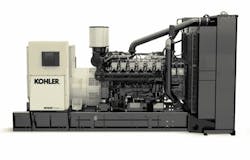Bright Future of Many Energies: Kohler Power leader details Microgrid, Biofuel efforts
The father of American electricity, Thomas Edison, reportedly said this and it never rings more true than now. Recycling all parts of the consumption chain may prove to guide us out of the current fuel and climate crises.
On the EnergyTech beat, many companies are starting embracing waste products such as animal fats and vegetable oil in the energy value chain. Recent stories include Enchanted Rock’s deal to use biomass-fueled generation at a Microsoft data center in California.
Various forecasts predict that the global revenue for biodiesel, renewable natural gas and other biofuels could grow close to 20 percent higher to above $200 billion by 2030.
On another front, generator manufacturer Kohler Power Systems adapted all of its fleet of diesel-powered generators to now run on hydrotreated vegetable oil (HVO). The emergence of generator-ready HVO makes use of plant stock and improves the greenhouse gas emissions profile compared with diesel generators, the company said. Feedstocks can include canola, algae, palm oil and tallow.
Hervé Prigent, vice president of marketing globally for Kohler Power Systems, recently spoke exclusively with EnergyTech about all of the new work and potential around HVO in backup and emergency power generation. Clearly, the company sees HVO as a sign of the times.
“The world is moving to the green stuff, and HVO is an amazing breakthrough” in terms of cost, efficiency and environmental improvements, Prigent said. “We’re aiming for a 100-percent circular economy. And we’re not growing foods; we are talking about waste, 100 percent waste.”
Read our story about Kohler Power's Biofuels Breakthrough with HVO
See EnergyTech's full coverage of the Microgrid movement
Subscribe to our free email newsletter for more Insights into the C&I Energy Transition
The carbon footprint of HVO is 90-percent lower than the diesel fuels traditionally used in on-site power generators, the company said. Some processing is used in refining the HVO, but those can include hydrogen, which itself does not include a carbon emission directly.
Diesel is certainly not going away, as its fuel density and capacity factors are still important for much of backup power above 1 MW, he noted. However, the future of HVO shows strong potential in bringing a part of a multi-faceted carbon reduction approach.
“We can have a bright future if we’re able to mix all the energies going forward,” Prigent said. “We need a little bit of everything.”
His optimism in the future partially comes from a past steeped in a familial combination of energy and environment. Prigent’s family kept greenhouses during his childhood, raising produce such as strawberries and using the generator both to fortify their green thumbs and to cut back on energy costs by a small-scale form of peak shaving.
“I was born in the generator business,” he pointed out with a smile.
Prigent gets happy talking about some of Kohler Power’s other moves in the commercial and industrial energy transition. For instance, the legacy generator maker acquired microgrid controls firm Heila Technologies in a deal announced earlier this year.
Microgrids are certainly expanding in complexity with combinations of solar, battery storage and on-site gen-sets. At their traditional heart, of course, is that good old generator.
“It will be big for several reasons,” Prigent said on the microgrid future market possibilities. “First of all, climate change will cause more issues for the grid (such as weather events and peak demand challenges).
“And most people don’t understand, but moving from the gasoline car to the EV will not change the world. We’re moving energy from the automobile to electricity...and most countries are producing energy from coal or gas,” he added.
Microgrids offer several benefits, from energy resiliency to sustainability when carbon-free or low-carbon resources are activated. Combining rooftop solar with batteries and HVO or another biomass-fueled generator set will provide significant net emissions reductions.
“We’ll have the ability to connect all the resources in a smarter way,” Prigent predicted.
-- -- --
(Rod Walton, senior editor for EnergyTech, is a 14-year veteran of covering the energy industry both as a newspaper and trade journalist. He can be reached at [email protected]).
About the Author
Rod Walton, EnergyTech Managing Editor
Managing Editor
For EnergyTech editorial inquiries, please contact Managing Editor Rod Walton at [email protected].
Rod Walton has spent 17 years covering the energy industry as a newspaper and trade journalist. He formerly was energy writer and business editor at the Tulsa World. Later, he spent six years covering the electricity power sector for Pennwell and Clarion Events. He joined Endeavor and EnergyTech in November 2021.
Walton earned his Bachelors degree in journalism from the University of Oklahoma. His career stops include the Moore American, Bartlesville Examiner-Enterprise, Wagoner Tribune and Tulsa World.
EnergyTech is focused on the mission critical and large-scale energy users and their sustainability and resiliency goals. These include the commercial and industrial sectors, as well as the military, universities, data centers and microgrids. The C&I sectors together account for close to 30 percent of greenhouse gas emissions in the U.S.
He was named Managing Editor for Microgrid Knowledge and EnergyTech starting July 1, 2023
Many large-scale energy users such as Fortune 500 companies, and mission-critical users such as military bases, universities, healthcare facilities, public safety and data centers, shifting their energy priorities to reach net-zero carbon goals within the coming decades. These include plans for renewable energy power purchase agreements, but also on-site resiliency projects such as microgrids, combined heat and power, rooftop solar, energy storage, digitalization and building efficiency upgrades.


